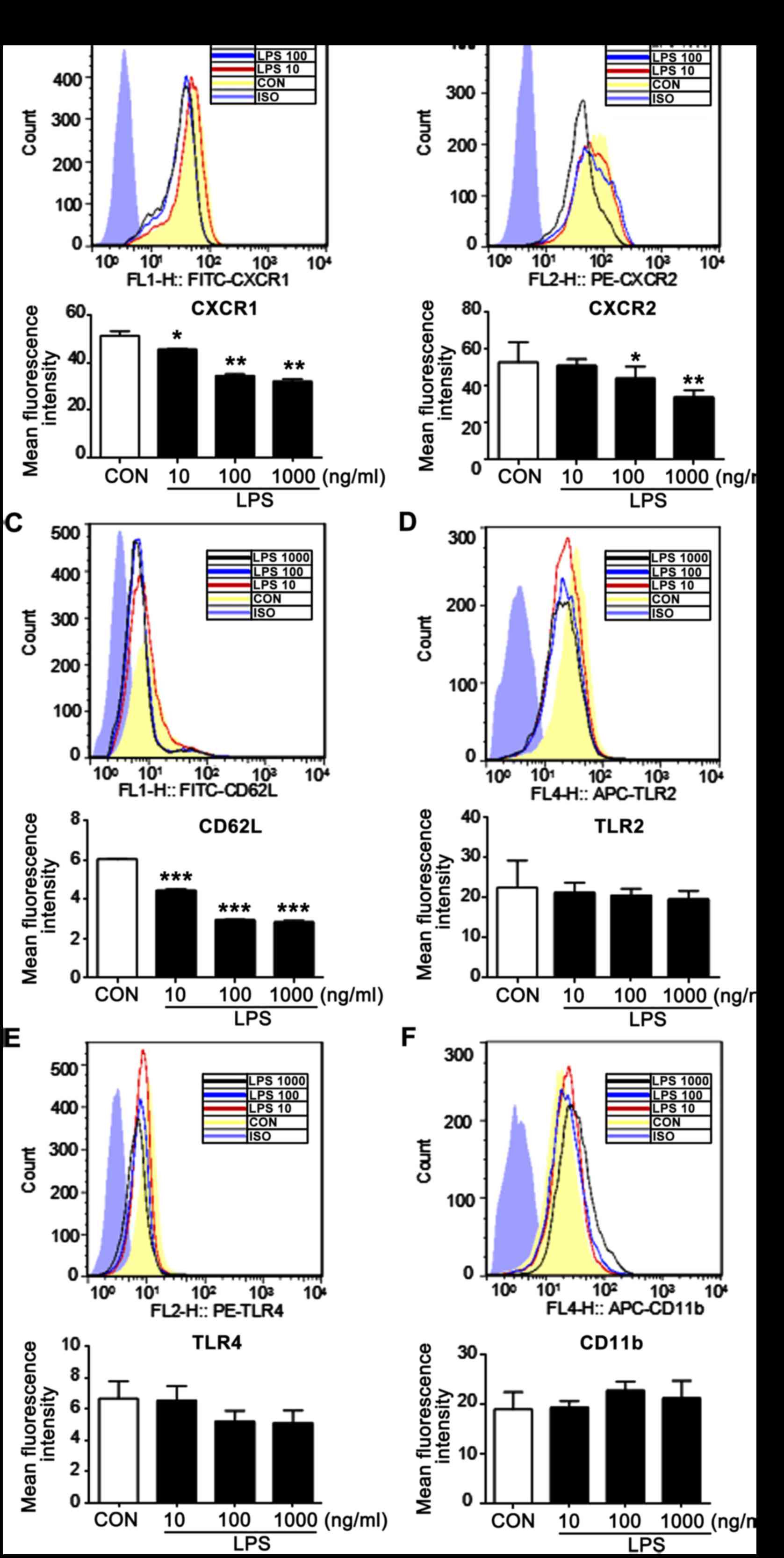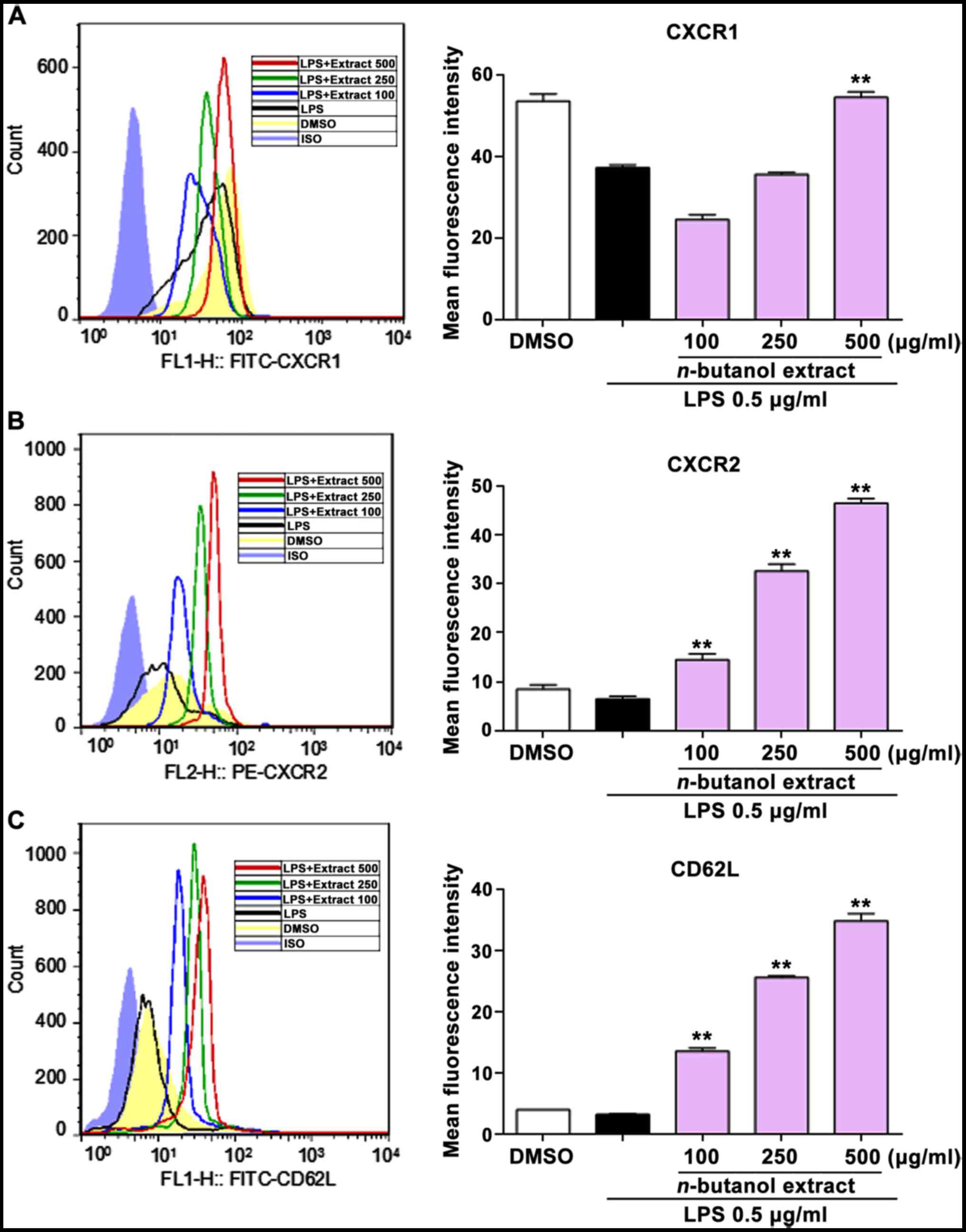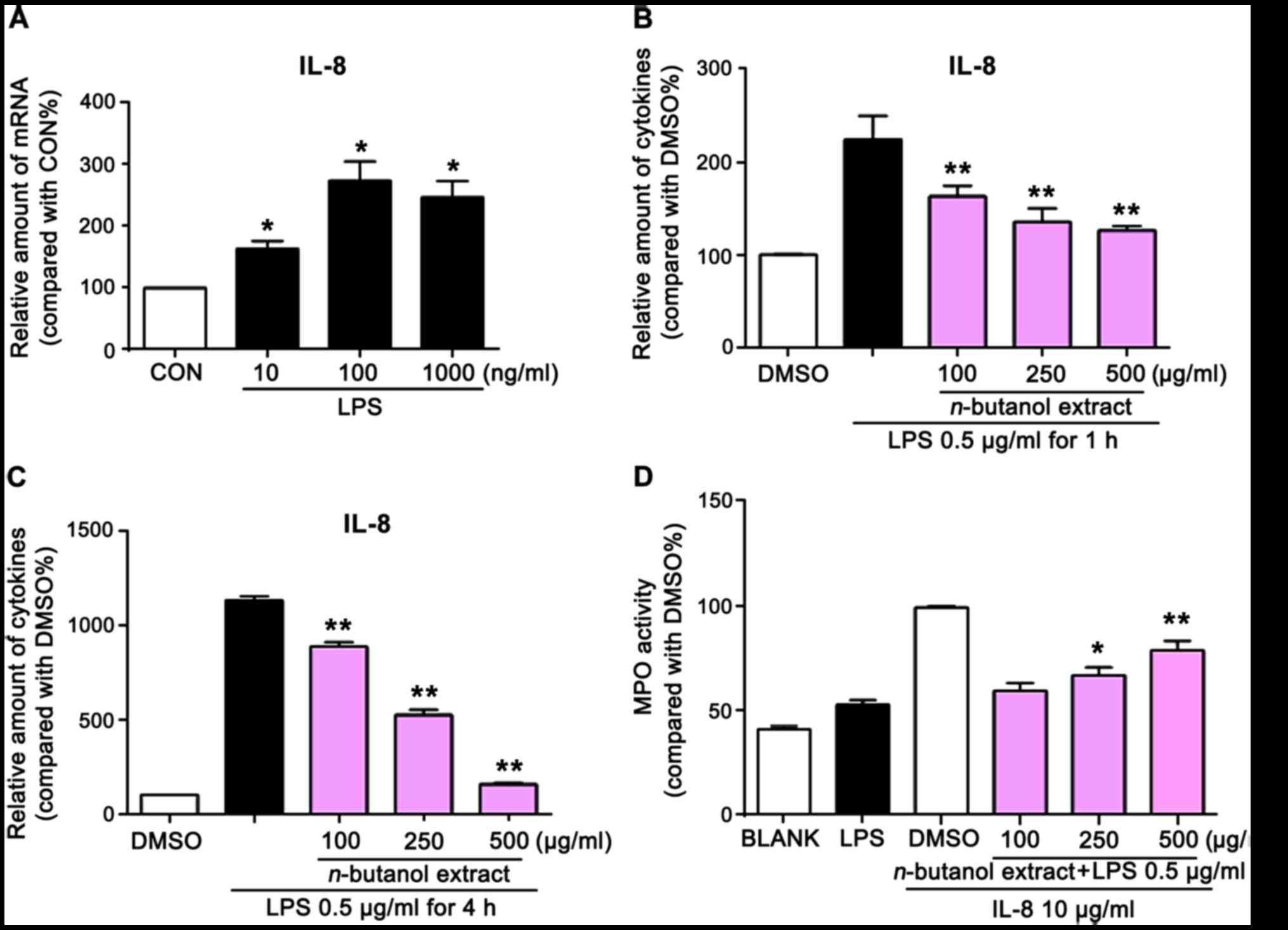|
1
|
Lee SK, Kim SD, Kook M, Lee HY, Ghim J,
Choi Y, Zabel BA, Ryu SH and Bae YS: Phospholipase D2 drives
mortality in sepsis by inhibiting neutrophil extracellular trap
formation and down-regulating CXCR2. J Exp Med. 212:1381–1390.
2015. View Article : Google Scholar : PubMed/NCBI
|
|
2
|
Prucha M, Bellingan G and Zazula R: Sepsis
biomarkers. Clin Chim Acta. 440:97–103. 2015. View Article : Google Scholar : PubMed/NCBI
|
|
3
|
Drifte G, Dunn-Siegrist I, Tissières P and
Pugin J: Innate immune functions of immature neutrophils in
patients with sepsis and severe systemic inflammatory response
syndrome. Crit Care Med. 41:820–832. 2013. View Article : Google Scholar : PubMed/NCBI
|
|
4
|
Silva SC, Baggio-Zappia GL, Brunialti MK,
Assunçao MS, Azevedo LC, Machado FR and Salomao R: Evaluation of
Toll-like, chemokine, and integrin receptors on monocytes and
neutrophils from peripheral blood of septic patients and their
correlation with clinical outcomes. Braz J Med Biol Res.
47:384–393. 2014. View Article : Google Scholar : PubMed/NCBI
|
|
5
|
Seeley EJ, Matthay MA and Wolters PJ:
Inflection points in sepsis biology: From local defense to systemic
organ injury. Am J Physiol Lung Cell Mol Physiol. 303:L355–L363.
2012. View Article : Google Scholar : PubMed/NCBI
|
|
6
|
Boppana NB, Devarajan A, Gopal K, Barathan
M, Bakar SA, Shankar EM, Ebrahim AS and Farooq SM: Blockade of
CXCR2 signalling: A potential therapeutic target for preventing
neutrophil-mediated inflammatory diseases. Exp Biol Med (Maywood).
239:509–518. 2014. View Article : Google Scholar : PubMed/NCBI
|
|
7
|
Jaillon S, Galdiero MR, Del Prete D,
Cassatella MA, Garlanda C and Mantovani A: Neutrophils in innate
and adaptive immunity. Semin Immunopathol. 35:377–394. 2013.
View Article : Google Scholar : PubMed/NCBI
|
|
8
|
Park DW, Jiang S, Tadie JM, Stigler WS,
Gao Y, Deshane J, Abraham E and Zmijewski JW: Activation of AMPK
enhances neutrophil chemotaxis and bacterial killing. Mol Med.
19:387–398. 2013. View Article : Google Scholar : PubMed/NCBI
|
|
9
|
Takahashi M, Ishiko T, Kamohara H, Hidaka
H, Ikeda O, Ogawa M and Baba H: Curcumin
(1,7-bis(4-hydroxy-3-methoxyphenyl)-1,6-heptadiene-3,5-dione)
blocks the chemotaxis of neutrophils by inhibiting signal
transduction through IL-8 receptors. Mediators Inflamm.
2007:107672007. View Article : Google Scholar : PubMed/NCBI
|
|
10
|
Ishii M, Asano K, Namkoong H, Tasaka S,
Mizoguchi K, Asami T, Kamata H, Kimizuka Y, Fujiwara H, Funatsu Y,
et al: CRTH2 is a critical regulator of neutrophil migration and
resistance to polymicrobial sepsis. J Immunol. 188:5655–5664. 2012.
View Article : Google Scholar : PubMed/NCBI
|
|
11
|
Tarlowe MH, Duffy A, Kannan KB, Itagaki K,
Lavery RF, Livingston DH, Bankey P and Hauser CJ: Prospective study
of neutrophil chemokine responses in trauma patients at risk for
pneumonia. Am J Respir Crit Care Med. 171:753–759. 2005. View Article : Google Scholar : PubMed/NCBI
|
|
12
|
Tikhonov I, Doroshenko T, Chaly Y,
Smolnikova V, Pauza CD and Voitenok N: Down-regulation of CXCR1 and
CXCR2 expression on human neutrophils upon activation of whole
blood by S. aureus is mediated by TNF-alpha. Clin Exp Immunol.
125:414–422. 2001. View Article : Google Scholar : PubMed/NCBI
|
|
13
|
Deng M, Ma T, Yan Z, Zettel KR, Scott MJ,
Liao H, Frank A, Morelli AE, Sodhi CP, Hackam DJ and Billiar TR:
Toll-like receptor 4 signaling on dendritic cells suppresses
polymorphonuclear leukocyte CXCR2 expression and trafficking via
interleukin 10 during intra-abdominal sepsis. J Infect Dis.
213:1280–1288. 2016. View Article : Google Scholar : PubMed/NCBI
|
|
14
|
Tancevski I, Nairz M, Duwensee K, Auer K,
Schroll A, Heim C, Feistritzer C, Hoefer J, Gerner RR, Moschen AR,
et al: Fibrates ameliorate the course of bacterial sepsis by
promoting neutrophil recruitment via CXCR2. EMBO Mol Med.
6:810–820. 2014.PubMed/NCBI
|
|
15
|
Van Zee KJ, DeForge LE, Fischer E, Marano
MA, Kenney JS, Remick DG, Lowry SF and Moldawer LL: IL-8 in septic
shock, endotoxemia, and after IL-1 administration. J Immunol.
146:3478–3482. 1991.PubMed/NCBI
|
|
16
|
Deng YP, Liu YY, Liu Z, Li J, Zhao LM,
Xiao H, Ding XH and Yang ZQ: Antiviral activity of Folium isatidis
derived extracts in vitro and in vivo. Am J Chin Med. 41:957–969.
2013. View Article : Google Scholar : PubMed/NCBI
|
|
17
|
Liu Z, Yang ZQ and Xiao H: Antiviral
activity of the effective monomers from Folium Isatidis against
influenza virus in vivo. Virol Sin. 25:445–451. 2010. View Article : Google Scholar : PubMed/NCBI
|
|
18
|
Fang JG, Hu Y, Tang J, Wang WQ and Yang
ZQ: Antiviral effect of Folium Isatidis on herpes simplex virus
type I. Zhongguo Zhong Yao Za Zhi. 30:1343–1346. 2005.(In Chinese).
PubMed/NCBI
|
|
19
|
Lau TF, Leung PC, Wong EL, Fong C, Cheng
KF, Zhang SC, Lam CW, Wong V, Choy KM and Ko WM: Using herbal
medicine as a means of prevention experience during the SARS
crisis. Am J Chin Med. 33:345–356. 2005. View Article : Google Scholar : PubMed/NCBI
|
|
20
|
Liu CS, Cham TM, Yang CH, Chang HW, Chen
CH and Chuang LY: Antibacterial properties of Chinese herbal
medicines against nosocomial antibiotic resistant strains of
Pseudomonas aeruginosa in Taiwan. Am J Chin Med. 35:1047–1060.
2007. View Article : Google Scholar : PubMed/NCBI
|
|
21
|
Liau BC, Jong TT, Lee MR and Chen SS:
LC-APCI-MS method for detection and analysis of tryptanthrin,
indigo and indirubin in daqingye and banlangen. J Pharm Biomed
Anal. 43:346–351. 2007. View Article : Google Scholar : PubMed/NCBI
|
|
22
|
Jiang L, Lu Y, Jin J, Dong L, Xu F, Chen
S, Wang Z, Liang G and Shan X: n-Butanol extract from Folium
isatidis inhibits lipopolysaccharide-induced inflammatory cytokine
production in macrophages and protects mice against
lipopolysaccharide-induced endotoxic shock. Drug Des Devel Ther.
9:5601–5609. 2015.PubMed/NCBI
|
|
23
|
Khandaker MH, Xu L, Rahimpour R, Mitchell
G, DeVries ME, Pickering JG, Singhal SK, Feldman RD and Kelvin DJ:
CXCR1 and CXCR2 are rapidly down-modulated by bacterial endotoxin
through a unique agonist-independent, tyrosine kinase-dependent
mechanism. J Immunol. 161:1930–1938. 1998.PubMed/NCBI
|
|
24
|
Iskander KN, Craciun FL, Stepien DM, Duffy
ER, Kim J, Moitra R, Vaickus LJ, Osuchowski MF and Remick DG: Cecal
ligation and puncture-induced murine sepsis does not cause lung
injury. Crit Care Med. 41:159–170. 2013. View Article : Google Scholar : PubMed/NCBI
|
|
25
|
Vincent JL, Rello J, Marshall J, Silva E,
Anzueto A, Martin CD, Moreno R, Lipman J, Gomersall C, Sakr Y, et
al: International study of the prevalence and outcomes of infection
in intensive care units. JAMA. 302:2323–2329. 2009. View Article : Google Scholar : PubMed/NCBI
|
|
26
|
Kipnis E: Neutrophils in sepsis: Battle of
the bands. Crit Care Med. 41:925–926. 2013. View Article : Google Scholar : PubMed/NCBI
|
|
27
|
Duerschmied D, Suidan GL, Demers M, Herr
N, Carbo C, Brill A, Cifuni SM, Mauler M, Cicko S, Bader M, et al:
Platelet serotonin promotes the recruitment of neutrophils to sites
of acute inflammation in mice. Blood. 121:1008–1015. 2013.
View Article : Google Scholar : PubMed/NCBI
|
|
28
|
Sônego F, Alves-Filho JC and Cunha FQ:
Targeting neutrophils in sepsis. Expert Rev Clin Immunol.
10:1019–1028. 2014. View Article : Google Scholar : PubMed/NCBI
|
|
29
|
Rivers E, Nguyen B, Havstad S, Ressler J,
Muzzin A, Knoblich B, Peterson E and Tomlanovich M: Early
Goal-Directed Therapy Collaborative Group: Early goal-directed
therapy in the treatment of severe sepsis and septic shock. N Engl
J Med. 345:1368–1377. 2001. View Article : Google Scholar : PubMed/NCBI
|
|
30
|
Czepielewski RS, Porto BN, Rizzo LB,
Roesler R, Abujamra AL, Pinto LG, Schwartsmann G, Fde Cunha Q and
Bonorino C: Gastrin-releasing peptide receptor (GRPR) mediates
chemotaxis in neutrophils. Proc Natl Acad Sci USA. 109:547–552.
2012. View Article : Google Scholar : PubMed/NCBI
|


















